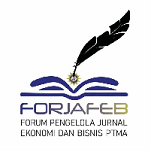GENDER SELF EFFICACY TEKANAN KETAATAN KOMPLEKSITAS TUGAS DAN PENGALAMAN AUDITOR TERHADAP AUDIT JUDGEMENT
Abstract
The quality of the audit judgment produced by the auditor determines the quality of the overall audit results. This study aims to determine the effect of gender, self-efficacy, obedience pressure, task complexity, and auditor experience on audit judgment. This study uses quantitative methods with a sample size of 104 internal auditors at the Inspectorate General of the Ministry of Finance. The data used are primary data obtained through distributing questionnaires and then processed using the IBM SPSS version 25 application. The results of the study concluded that self-efficacy and auditor experience had a positive and significant effect on audit judgment. This shows that the competence, experience, and expertise of auditors have a positive and significant effect on the resulting audit judgment. Meanwhile, obedience pressure has a negative and significant effect on audit judgment. Pressure for obedience can come from superiors and auditors. Meanwhile, gender and task complexity have no effect on audit judgment. Audit assignments are preceded by a comprehensive audit planning process and support from the unit related to gender responsive policies that support the assignment.
Keywords
Full Text:
PDFReferences
Abdolmohammadi, M. & Wright, A. 1987. “An Examination of The Effects of Experience and Task Complexity on Audit Judgements”. Accounting Review, 1-13.
Armanda, Ranggi. 2014. “Pengaruh Etika Profesi, Pengetahuan, Pengalaman, dan Independensi terhadap Auditor Judgement pada Badan Pemeriksa Keuangan (BPK) Perwakilan Sumatera Selatan”. Jurnal Manajemen dan Bisnis Sriwijaya Vol.12 No.2. 75-90.
Asih, Dwi A. T. 2006. “Pengaruh Pengalaman Terhadap Peningkatan Keahlian Auditor Dalam Bidang Auditing” (Skripsi). Fakultas Ekonomi Universitas Islam Indonesia, Yogyakarta.
Bandura, Albert. 1986. Social Foundations Of Thought And Action. Englewood Cliffs, NJ: Prentice Hall.
Bandura, Albert. 1993. “Perceived Self Efficacy In Cognitive Development And Functioning”. Educational Psychologist, 28(2), 117-148.
Bonner, Sarah E., & Lewis, Barry L. 1990. “Determinants of Auditor Expertise”. Journal
ofAccounting Research, 28, 1-20.
Bonner, Sarah E. 1994. “A model of the effects of audit task complexity”. Accounting,
Organizations and Society, 19(3), 213-234.
Bonner, Sarah E., dan Sprinkle, Geoffrey B. 2002. ”The Effects Of Monetary Incentives On Effort And Task Performance: Theories, Evidence, And A Framework For Research”.
Accounting, Organizations and Society, 27(4-5), 303-345.
Fitriana, Rahayu. 2014. ”Pengaruh Kompleksitas Tugas, Tekanan Ketaatan, Tingkat Senioritas Auditor, Keahlian Auditor, dan Hubungan dengan Klien terhadap Audit Judgement”. Jurnal Online Mahasiswa Fakultas Ekonomi Universitas Riau Vol.1 No. 2. 1-14.
Ghozali, Imam. 2013. Aplikasi Analisis Multivariete dengan Program IBM SPSS 23. Semarang: Badan Penderbit Universitas Diponegoro.
Hayati, Nur. 2011. “Pengaruh Gender, Tekanan Ketaatan, Kompleksitas Tugas, Pengetahuan dan Pengalaman Terhadap Audit Judgment”. Jurnal Riset Akuntansi dan Komputerisasi Akuntansi. Vol.2, No.2. 43-56.
Idris, Fitriani Seni. 2012. “Pengaruh Tekanan Ketaatan, Kompleksitas Tugas, Pengetahuan dan Persepsi Etis Terhadap Audit Judgement” (Skripsi). Fakultas Ekonomika dan Bisnis Universitas Diponegoro, Semarang.
Inspektorat Jenderal Kementerian Keuangan RI. 2019. Laporan Kinerja Inspektorat Jenderal Kementerian Keuangan.
Iskandar, T. M. & Sanusi, Z. M. 2011. “Assessing the effects of self efficacy and task complexity on internal control audit judgement”. Asian Academy of Management Journal of Accounting and Finance, 7(1).
Jamilah, S., Fanani, Z., & Chandrarin, G. 2007. ”Pengaruh Gender, Tekanan Ketaatan, Dan Kompleksitas Tugas terhadap Audit Judgement”. Simposium Nasional
Akuntansi X, 26-28.
Krech, D., & Crutchfield, R. S. 1948. Theory and Problems of Social Psychology. McGraw-Hill.
Lestari, Rika J. (2015). “Pengaruh Skeptisme, Pengalaman auditor dan Self-efficacy Terhadap Audit Judgement” (Skripsi). Universitas Islam Negeri Syarif Hidayatullah, Jakarta.
Maryani, T. & Ludigdo, U. 2001. ”Survei atas Faktor-Faktor yang Mempengaruhi Sikap dan Perilaku Tidak Etis Akuntan”. TEMA. Volume II Nomor 1. Maret. P.49-62.
Maghfirah, Indah & Yahya, M. R. 2018. ”Pengaruh Kompleksitas Tugas, Self-Efficacy, Dan Pengalaman Audit Terhadap Audit Judgement (Studi Pada Auditor BPK RI Perwakilan Provinsi Aceh)”. Jurnal Ilmiah Mahasiswa Ekonomi Akuntansi (JIMEKA) Vol. 3, No. 2. 276-288.
McClelland, David C. 1961. The Achieving Society. NY: Van Nostrand.
Meyer & Levy, J. 1986. Gender Differences in Information Processing: A Selectivity Interpretation. In Cognitive and Affective Responses to Advertising., edited by P., Cafferata & M. Tybout., 219-260, MA: Lexington Books., Lexington.
Nasution, Damai & Östermark, Ralf. 2012. “The impact of social pressures, locus of
control, and professional commitment on auditors’ judgement: Indonesian evidence”. Asian Review of Accounting, 20(2), 163-178.
Neufeldt, Victoria. 1993. Webster’s New World Dictionary. New York: Webster’s New World Dictionary.
Nugraha, Aditya P. 2015. ”Pengaruh Gender, Pengalaman, Keahlian Auditor dan Tekanan Ketaatan terhadap Auditor Judgement dengan Kompleksitas Tugas Sebagai Variabel Moderasi pada BPK RI Jawa Tengah”. Diponegoro Journal Of Accounting Vol. 4 No. 4. 1-11.
O’Donnell, E., and E. N. Johnson. 1999. The effects of gender and task complexity on information processing effort during planning analytical procedures. Working paper, Arizona State University, Tempe, Arizona.
Peraturan Menteri Keuangan nomor 237/PMK.09/2016 tentang Tata Kelola Pengawasan Intern di Lingkungan Kementerian Keuangan.
Puspaningsih, A., & Enggar, D. 2004. ”Pengaruh Persuasi Atas Preferensi Klien Dan Pengalaman Audit Terhadap Pertimbangan Auditor Dalam Mengevaluasi Bukti Audit”. Jurnal Manajemen dan Bisnis Universitas Padjajaran, Vol. 1(6).
Putri, Andini R. 2017. ”Pengaruh Tekanan Anggaran Waktu, Kompleksitas Tugas, Pengetahuan Auditor, dan Pengalaman Auditor terhadap Audit Judgement”. Jurnal Online Mahasiswa Fakultas Ekonomi Universitas Riau Vol.4 No.1. 1282-1294.
Ratmono, Dwi dan Mahfud Sholihin. 2013. Analisis SEM-PLS dengan WarpPLS 3.0. Yogyakarta: ANDI.
Sanusi, Z. M., Iskandar, T. M., & Poon, June M. L. 2007. ”Effects of goal orientation and task complexity on audit judgement performance”. MalaysianAccounting Review, 6(2).
Sari, Indah P. 2016. ”Pengaruh Gender, Tekanan Ketaatan, Kompleksitas Tugas, Pengalaman Auditor, Pengetahuan Auditor dan Kompleksitas Dokumen Audit terhadap Audit Judgement”. Jurnal Online Mahasiswa Fakultas Ekonomi Universitas Riau Vol.3 No.1. 2008-2022.
Satiman. 2018. ”Pengaruh Self Efficacy, Tekanan Ketaatan, Locus of Control, dan Kompleksitas Tugasterhadap Audit Judgement”. Jurnal Ilmiah Akuntansi Universitas Pamulang Vol.6 No.1. 1-28.
Sharon, Priscillia. 2017. ”Analisis Faktor – Faktor yang Mempengaruhi Audit Judgement pada Perusahaan Konsultan Bisnis Kecil di Tangerang”. Jurnal Bina Akuntansi Vol.5 No.2.141 – 156.
Suwandi. 2015. ”Pengaruh Self Efficacy, Kecerdasan Emosional, Tekanan Ketaatan dan Kompleksitas Tugas Terhadap Audit Judgement Auditor”. Jurnal Online Mahasiswa Fakultas Ekonomi Universitas Riau Vol. 2 No.1. 1-15.
DOI: https://doi.org/10.32502/jab.v6i1.3405
Refbacks
- There are currently no refbacks.
Program Studi Akuntansi Fakultas Ekonomi dan Bisnis, Universitas Muhammadiyah Palembang
Jl. Jenderal A. Yani 13 Ulu, Seberang Ulu II, Palembang (30263), Indonesia.
Indexed by :














.jpg)


